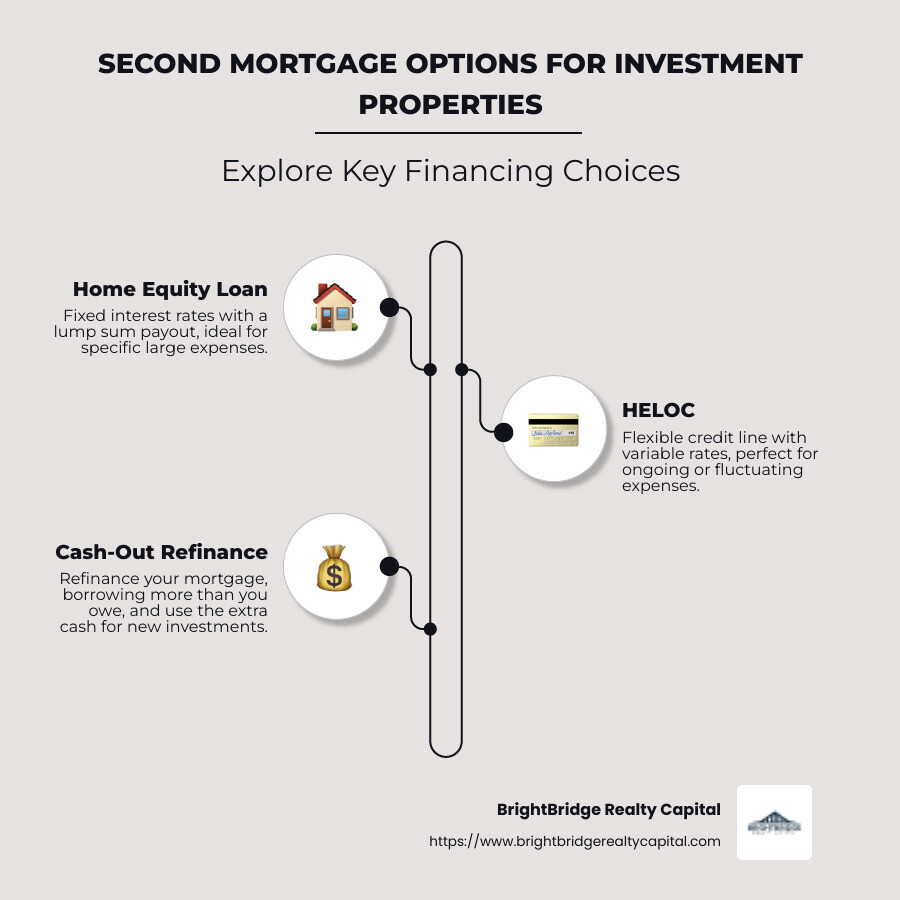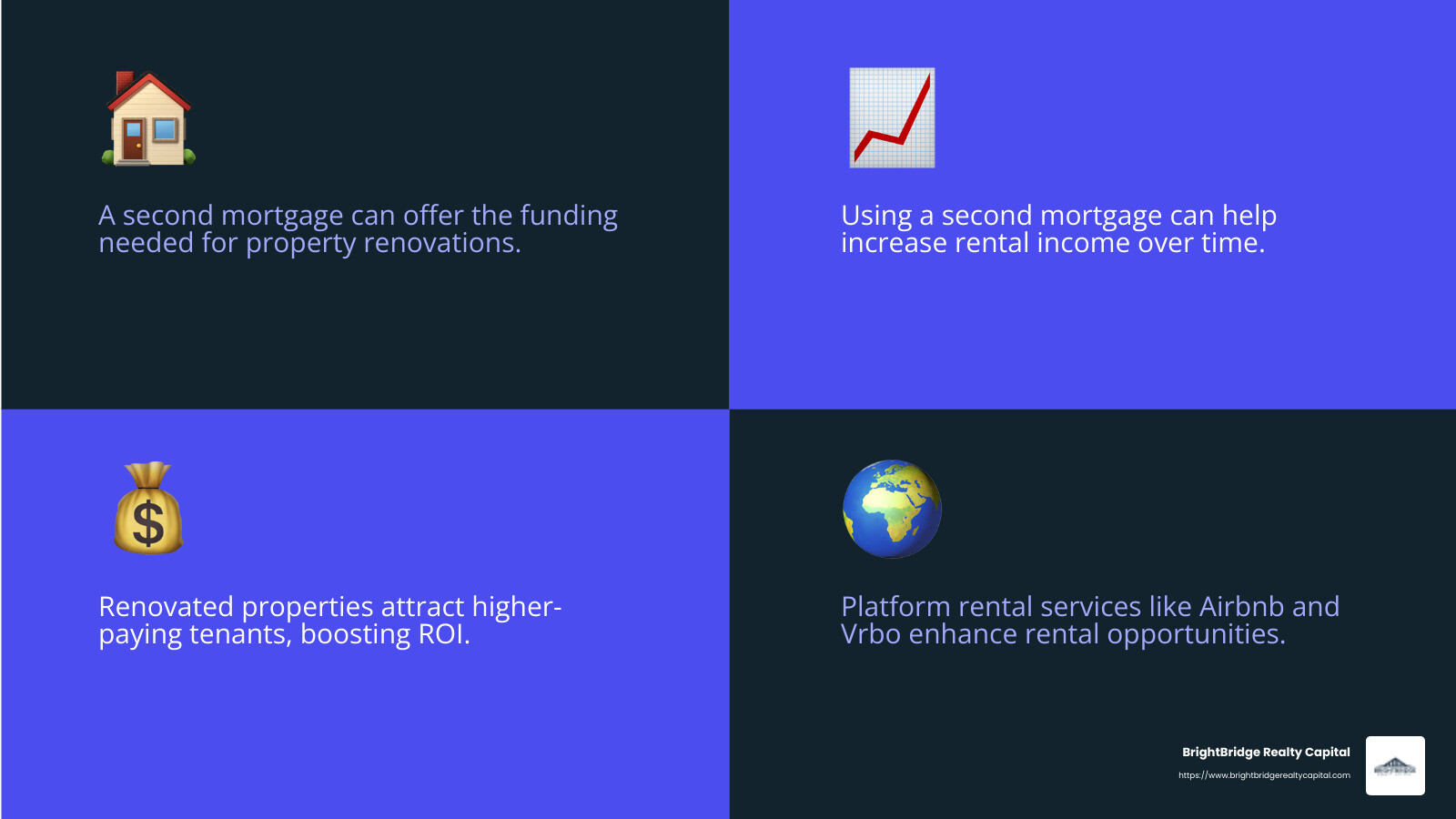Second Chances: Navigating the World of Second Mortgages for Investment Properties

Second mortgage on investment property is a topic of growing interest among savvy real estate investors. If you're looking to expand your real estate portfolio or tap into the value of your existing properties, understanding the advantages and considerations of a second mortgage can be pivotal. Here’s a quick overview of why this financial tool might be right for you:
- Leverage Home Equity: Use the value of your current property to secure a loan and access funds.
- Flexible Financing Options: Choose between Home Equity Loans and Home Equity Lines of Credit (HELOCs) to fit your financial needs.
- Potential Tax Benefits: Depending on how the funds are used, you may benefit from certain tax deductions.
Exploring investment property financing isn't just about buying and selling; it's about smart financial strategizing. Whether it's a second home by the beach you want to rent out, or upgrading an existing rental, multiple financing options can help you seize opportunity.
Maximize your existing equity, consider the risks. BrightBridge Realty Capital is here to assist, offering insight into leveraging second mortgages effectively.

Quick second mortgage on investment property terms:
- investment property equity line of credit
- getting a line of credit on a rental property
- refinancing primary residence to investment property
Understanding Second Mortgages
Second mortgages are an intriguing option for homeowners and investors alike. Let's break it down simply.
Home Equity is the key to open uping a second mortgage. It’s the difference between what your property is worth and what you owe on your first mortgage. As you pay down your mortgage, your equity grows. This equity can be tapped into through a second mortgage to fund other projects or investments.
A second mortgage is considered a subordinate loan. This means it ranks below your first mortgage in priority. If you default, the first mortgage lender gets paid first from any sale proceeds. Because of this, second mortgages often come with higher interest rates.
Your home acts as collateral for the second mortgage. Essentially, you're betting on your property's value to secure another loan. This can be both an opportunity and a risk. If property values drop, or if you can’t make payments, you could face foreclosure.

Why do people take out second mortgages?
- To finance large purchases or investments
- To consolidate debt
- To make home improvements
It's important to weigh the benefits against the risks. Second mortgages can be a smart financial move if managed wisely. But remember, your home is on the line. Always ensure you can handle the payments before committing.
Next, we'll dive into the benefits of taking out a second mortgage on an investment property.
Benefits of a Second Mortgage on Investment Property
Taking out a second mortgage on investment property can open doors to new opportunities. Let's explore how it can benefit you.
Additional Financing
A second mortgage can provide the extra funding you need to grow your investment portfolio. This is especially useful if you want to buy more properties or make improvements to existing ones. Think of it as a financial tool that helps you leverage the equity in your investment property. With this additional financing, you can seize opportunities that might otherwise be out of reach.
Rental Property Income
Owning a rental property can be a steady source of income. A second mortgage can help you maximize this potential. For instance, you can use the funds to renovate and upgrade the property, making it more attractive to tenants. This can lead to higher rental income and increase the property's value over time. Platforms like Airbnb and Vrbo make it easier than ever to rent out your property, offering the chance to cover your mortgage payments and even make a profit.
Investment Growth
Real estate has long been a solid investment strategy. By using a second mortgage, you can expand your real estate holdings and diversify your investment portfolio. Over time, property values tend to rise, offering the potential for significant returns. Additionally, as you pay down the mortgage on your rental property, your equity increases, further enhancing your financial position.

In summary, a second mortgage on an investment property can be a powerful tool for financial growth. It provides the means to expand your investments, improve rental income, and increase the value of your properties. However, it's crucial to manage this additional debt wisely to avoid potential risks.
Up next, we'll discuss how to qualify for a second mortgage and what you need to know before applying.
How to Qualify for a Second Mortgage
Qualifying for a second mortgage on investment property involves meeting specific financial criteria. Let's break it down into three key areas: credit score, loan-to-value ratio, and debt service coverage ratio.
Credit Score
Your credit score plays a big role in qualifying for a second mortgage. Most lenders look for a score of 620 or higher. A strong credit score not only increases your chances of approval but can also help you secure better loan terms. Lenders see a high credit score as a sign that you're likely to repay the loan on time.
Loan-to-Value Ratio
The loan-to-value (LTV) ratio compares the loan amount to the appraised value of the property. For a second mortgage, lenders typically require an LTV of 80% or less. This means you should have a decent amount of equity in your property. The more equity you have, the more you can potentially borrow. The LTV ratio ensures that the lender is not over-leveraging the property, reducing their risk.
Debt Service Coverage Ratio
The debt service coverage ratio (DSCR) measures your property's ability to generate enough income to cover the debt payments. A DSCR of 1 or higher is ideal, as it indicates that the property generates sufficient income to cover the mortgage. This is crucial for lenders because it shows that the property itself can support the debt, making it a less risky investment.
In short, qualifying for a second mortgage requires a blend of good credit, sufficient equity, and a solid income-generating property. By meeting these criteria, you can improve your chances of securing the financing you need to grow your real estate investments.
Next, we'll explore the risks and considerations you should be aware of before taking on a second mortgage.
Risks and Considerations
Securing a second mortgage on investment property can be a savvy move, but it comes with its own set of risks and considerations. Let's explore the key factors you need to keep in mind.
Foreclosure Risk
One of the biggest risks with a second mortgage is foreclosure. If you can't make the payments on either your first or second mortgage, you risk losing your property. A second mortgage increases your debt load, which can strain your finances. It's crucial to have a solid plan in place to ensure you can meet all your payment obligations.
Interest Rates
Interest rates for second mortgages are typically higher than those for primary mortgages. This is because lenders consider them riskier. It's important to shop around and compare rates from different lenders to find the best deal. Keep an eye on market trends, as interest rates can fluctuate, affecting your monthly payments and overall cost of borrowing.
Property Value Fluctuations
Real estate markets can be unpredictable. Property values can rise and fall due to various factors like economic changes or local developments. If the value of your investment property drops, it could affect your loan-to-value ratio and make it harder to refinance or sell the property. It's wise to stay informed about the local market and have a contingency plan in place for any downturns.
Taking out a second mortgage is a significant financial decision. By understanding these risks and considerations, you can make more informed choices and protect your investment.
Next, we'll address some frequently asked questions about second mortgages on investment properties.
Frequently Asked Questions about Second Mortgages on Investment Properties
What are the requirements for a second mortgage on an investment property?
To qualify for a second mortgage on investment property, you'll need to meet several key requirements:
Down Payment: Typically, lenders require a larger down payment for investment properties compared to primary residences. This is often at least 20% of the property's value.
Credit Score: A strong credit score is crucial. Most lenders look for a score of 620 or higher. The better your credit score, the more favorable your loan terms might be.
Loan Terms: Loan terms for second mortgages can vary. Expect higher interest rates than those for primary mortgages due to the increased risk for lenders. It's important to compare offers from different lenders to find the best terms.
Can I use a second mortgage to buy another investment property?
Yes, you can. A home equity loan or a cash-out refinance are two common ways to tap into your existing property's equity to fund the purchase of another investment property.
Home Equity Loan: This allows you to borrow against the equity in your current property. You receive a lump sum, which you can use as a down payment on another property.
Cash-Out Refinance: This involves refinancing your existing mortgage for more than you owe and taking the difference in cash. This cash can then be used to invest in another property.
Are second mortgages on investment properties tax deductible?
The tax implications of a second mortgage can be complex. Here's what you need to know:
- Interest Deduction: Interest on a second mortgage might be tax-deductible if the loan proceeds are used to buy, build, or substantially improve the property securing the loan. However, tax laws can be nuanced, so it's wise to consult a tax professional for personalized advice.
Understanding these frequently asked questions can help you steer the complexities of second mortgages on investment properties. This knowledge empowers you to make informed decisions and optimize your investment strategy.
Conclusion
Navigating the complexities of real estate financing can be daunting, but that's where we come in. At BrightBridge Realty Capital, we specialize in providing customized financing solutions custom to meet the unique needs of real estate investors. Whether you're looking to secure a second mortgage on investment property or explore other financing options, our team is here to help.
Our edge lies in our fast closings—often within a week. This speed allows you to seize opportunities as they arise, keeping your investment strategy on track. By cutting out intermediaries, we offer direct lending with competitive rates and a seamless process. This means less hassle and more focus on growing your investment portfolio.
Real estate investing is all about making smart financial moves. With our expertise and commitment to quick, flexible funding, you can confidently pursue your investment goals. Ready to take the next step? Explore our financing options and see how we can help bridge the gap in your investment journey.


